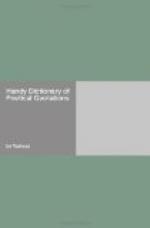It would talk,—
Lord! how it talked!
1861
BEAUMONT AND FLETCHER: Scornful Lady,
Act v., Sc. 1.
=Tasso.=
Tasso is their glory and their shame.
Hark to his strain! and then survey his cell!
And see how dearly earn’d Torquato’s fame,
And where Alfonso bade his poet dwell.
1862
BYRON: Ch. Harold, Canto iv., St.
36.
=Taste.=
Talk what you will of taste, my friend, you’ll find Two of a face as soon as of a mind. 1863 POPE: Satire vi., Line 268.
Good native Taste, tho’ rude, is seldom wrong,
Be it in music, painting, or in song:
But this, as well as other faculties,
Improves with age and ripens by degrees.
1864
ARMSTRONG: Taste, Line 26
Such and so various are the tastes of men. 1865 AKENSIDE: Pl. of the Imagination, Bk. iii., Line 567.
=Taxation.=
By heaven, I had rather coin my heart,
And drop my blood for drachmas, than to wring
From the hard hands of peasants their vile trash,
By any indirection.
1866
SHAKS.: Jul. Caesar, Act iv., Sc.
3.
Who nothing has to lose, the war bewails;
And he who nothing pays, at taxes rails.
1867
CONGREVE: Epis. to Sir Richard Temple.
Of Pleasing, Line 17.
=Tea.=
For her own breakfast she’ll project a scheme, Nor take her tea without a stratagem. 1868 YOUNG: Love of Fame, Satire vi., Line 190.
=Teaching.=
I have labored,
And with no little study, that my teaching
And the strong course of my authority
Might go one way.
1869
SHAKS.: Henry VIII., Act v., Sc. 2.
=Tears.=
The big round tears
Cours’d one another down his innocent nose
In piteous chase.
1870
SHAKS.: As You Like It, Act ii., Sc. 1.
Then fresh tears
Stood on her cheeks, as doth the honey-dew
Upon a gather’d lily almost wither’d.
1871
SHAKS.: Titus And., Act iii., Sc. 1.
Our present tears here, not our present laughter, Are but the handsells of our joys hereafter. 1872 HERRICK: Noble Numbers, Tears.
Thrice he assay’d, and thrice in spite of scorn, Tears, such as angels weep, burst forth. 1873 MILTON: Par. Lost, Bk. i., Line 619.
A child will weep a bramble’s smart,
A maid to see her sparrow part,
A stripling for a woman’s heart:
But woe awaits a country, when
She sees the tears of bearded men.
1874
SCOTT: Marmion, Canto v., St. 16.
To me the meanest flower that blows can give Thoughts that do often lie too deep for tears. 1875 WORDSWORTH: Intimations of Immortality.
Tears, idle tears, I know not what they mean,
Tears from the depth of some divine despair
Rise in the heart, and gather to the eyes,
In looking on the happy Autumn fields,
And thinking of the days that are no more.
1876
TENNYSON: The Princess, Pt. iv., Line
21.




